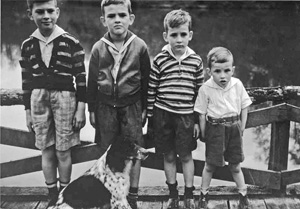Book Chronicles Life In The 'Old South'
By Jerry Brown
The Transylvania Times Online Edition | January 30, 2012 | Vol. 126-No. 9

Four Snyder Boys, 1941
Author is 2nd from left
Photo courtesy of John Snyder
Now the scolding from a sometimes harsh and impatient parent has become the title of a memoir that is receiving national notice.
Pulitzer Prize-winner Diane McWhorter said that Snyder "has recovered a lost universe with a particularity so fine and fresh as to create a kind of poetry."
"Hill of Beans: Coming of Age in the Last Days of the Old South" is now available at Highland Books in Brevard, Creekside Market in Cedar Mountain, and Malaprop's in Asheville.
The closely detailed story is accompanied by photographs of neighbors, among them Jim Gravley, the McGaha family and of historic sites.
Snyder is pleased that his efforts are being appreciated by old friends, new friends and rank strangers.
According to reviews, Snyder has succeeded in his mission, which he describes as preserving the memory of a world long gone, of "building houses with hand tools, taking corn to a grist mill, milking your own cows and churning your own butter, and of hearing mill whistles at dawn."
He has also preserved the memory of some exceptionally strong characters and presented his own upbringing without sentimentality.
The story opens with an account the author's early years and focuses primarily on a dynamic and demanding father who assessed his sons' prospects for success.
In 1917, Ted Snyder settled as a bachelor on Reasonover Road in Cedar Mountain and later became a primary builder in the area.
A self-taught man of many skills -- land surveyor, builder, and farmer -- he designed and supervised construction of mill camps, dams, a grist mill, and the 20-room Robin Hood Inn, in what is now Sherwood Forest.
He was also an oil painter, bridge player and reciter of reams of poetry.
At age 53, Ted married a young school teacher, Rebecca Clarke, who proved herself mountain-worthy and a friend to many other mothers and daughters in the area.
She and Ted were the parents of four boys, born within the first six years of their marriage.
In 1940, young John watched as the inn burned, torched almost certainly by arsonists.
The family was forced to find another living. Snyder and one of his brothers were sent for schooling in Greenville, S.C. and lived with a pair of eccentric aunts.
Kirkus Reviews singled out for special praise his depiction of these delightful relatives, from whom Snyder "learned about needlepoint, roosters and bigotry."
In the third section, the author deals with the family's change from a mountain family to lowland cotton farmers in Walhalla, S.C.
But they never broke their ties to Transylvania County, and now Snyder and his wife, Jenny, shuttle between their home in New York City and another, not far from his birthplace.
"I always wanted to come back," he said. "The day we left was the saddest day of my life."
Fifty-eight years after being burnt out and carried into a new phase of life, John Snyder did return, to what is now Sherwood Forest.
Over the years, Snyder has sustained neighborly contacts.
He visited Celia McGaha, who helped raise him and who was godmother, and her husband, H.P. Clark, yearly until their deaths, and now keeps up with her sister, Ola Faye Lance.
He also regularly gets together with Celia's four daughters: Sharon McCall, Barbara Whitmire, Kathy Newton and Caroline Whitman.
In fact, the book tells how Snyder's mother collaborated in the elopement of the Celia and H.P ., an adventure that forms a central passage.
The consistent opinion of critics is that however skilled Ted Snyder was, he was wrong in the "hill of beans" prophecy.
The Gravley family of Little River stand over the grave of Jim Gravley, who worked for the author's family.
John and his brothers all succeeded, and John in particular has displayed an array of talents to match his father's.
After graduating from the University of Chicago, he did Navy duty, became a buyer of glass and china at Bloomingdale's, spent 16 years in the carpet trade and secured seven patents for carpet implements.
He completed his professional career as a senior executive for the New York brokerage house Morgan Stanley.
He also wrote two plays produced off-Broadway and now he creates sculpture and is planning a sequel to "Hill of Beans."
Meanwhile, the praise has rolled in. The prominent Southern writer and humorist Roy Blount Jr. called Snyder's book "great stuff, extremely well remembered. There can't be many memories left of this time and place, and these are richly told."
